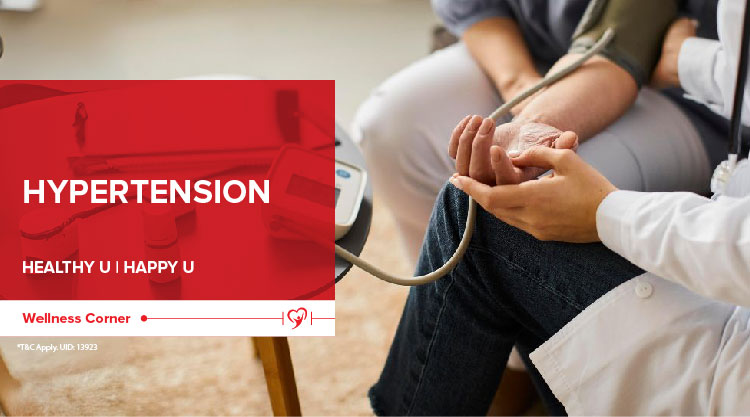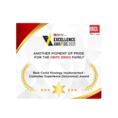

Everything You Need to Know About High Blood pressure
- Overview
- Causes
- Blood Pressure by Age
- Types
- Symptoms
- Risk Factors
- Harmful Effects
- Treatment
- Medication
- Manage Hypertension
- Prevention
- Conclusion
What is Hypertension?
Hypertension is when the blood pressure is higher than the normal range. Blood pressure is measured whenever the heart contracts or beats (systolic) and relaxes between beats (diastolic). In the case of hypertension, the systolic blood pressure reading is higher than 140 mm Hg, and the diastolic reading is higher than 90 mm Hg.
High blood pressure or hypertension happens when blood is forced or pushed against the artery walls for a long time. While it is normal for blood pressure to rise and fall throughout the day, it can damage the heart if it stays high for long. It is called hypertension. The condition develops over many years, usually without any symptoms.
According to the World Health Organisation: Hypertension is a condition in which the blood vessels have persistently raised pressure. This serious medical condition can significantly increase the risk of brain, heart, kidney and eye diseases.
What Causes High Blood Pressure?
Although the exact causes of hypertension are not known, the following can increase the risk:
- Not being physically active
- Being obese or overweight
- Consuming too much salt
- Smoking
- Drinking too much alcohol
- Ageing
- Genetics
- Mental stress
- Family history of high blood pressure
- Sleep apnoea
- Chronic kidney conditions
- Adrenal and thyroid disorders
What is Normal Blood Pressure by Age?
Normal blood pressure by age for men:
| Age | Systolic (mm Hg) | Diastolic (mm Hg)s |
| 20-25 years | 120 | 79 |
| 26-30 years | 120 | 77 |
| 31-35 years | 115 | 76 |
| 36-40 years | 121 | 76 |
| 41-45 years | 116 | 79 |
| 46-50 years | 120 | 80 |
| 51-55 years | 125 | 80 |
| 56-60 years | 130 | 80 |
| 61-65 years | 144 | 77 |
Normal blood pressure by age for women:
| Age | Systolic (mm Hg) | Diastolic (mm Hg)s |
| 20-25 years | 116 | 71 |
| 26-30 years | 114 | 72 |
| 31-35 years | 111 | 73 |
| 36-40 years | 113 | 75 |
| 41-45 years | 117 | 74 |
| 46-50 years | 124 | 79 |
| 51-55 years | 123 | 75 |
| 56-60 years | 133 | 79 |
| 61-65 years | 131 | 78 |
Hypertension Types
The two main types of hypertensions are primary hypertension and secondary hypertension.
1. Primary hypertension
Also known as essential hypertension, it is the most common type. While the exact cause is unclear, experts believe the following factors can lead to the condition.
- Gene mutations
- Genetic abnormalities inherited from parents
- Old age
- Living a sedentary lifestyle
- Not getting enough sleep
- Inadequate consumption of fruits and vegetables
- Obesity
- High intake of sodium
- Smoking
- High alcohol consumption
- Suffering from diabetes or metabolic syndrome
2. Secondary hypertension
This type of hypertension is related to an identifiable cause, particularly some underlying health conditions. Secondary hypertension is more common in younger people.
Certain factors that can lead to secondary hypertension are:
- Obstructive sleep apnoea
- Kidney disease
- Long-term kidney infections
- Glomerulonephritis or damage to the filters in the kidneys
- Congenital heart defects
- Narrowing of the arteries
- Diabetes
- Inactive or overactive thyroid
- Conditions like lupus and scleroderma
Other hormone problems like:
- Cushing’s syndrome: excess of cortisol hormone in the body
- Acromegaly: quick growth of bones and body tissues
- Pheochromocytoma: tumour of adrenal glands
- Increased levels of the aldosterone hormone
- Taking certain medications, such as decongestants, pain relievers and birth control pills
- Consuming illegal drugs
3. Other types of hypertension are
1. Resistant hypertension
This type can be challenging to control. In this, the blood pressure usually stays above the normal range even after taking different types of medications to lower blood pressure.
2. Malignant hypertension
It is a rare but most severe type as it can damage organs. This serious medical condition requires quick treatment. In malignant hypertension, systolic blood pressure is above 180 mm Hg, or the diastolic blood pressure is more significant than 120-130 mm Hg.
3. Isolated systolic hypertension
It is common in older adults. In isolated systolic hypertension, systolic blood pressure is above 140 mm Hg while diastolic blood pressure is below 90 mm Hg. The condition is reportedly caused due to hardening of arteries with age.
Symptoms of Hypertension
In most cases, people may not experience any high blood pressure symptoms. However, some with very high blood pressure may feel sick from time to time and experience one or more of the following symptoms:
- Headache
- Shortness of breath
- Irregular heart rhythms
- Chest pain
- Buzzing in ears
- Vision changes
- Nosebleeds
- Excessive sweating
- Anxiety and confusion
- Blushing
- Sleeping problems
- Nausea
- Fatigue
- Muscle tremors
Risk Factors of Hypertension
Risk factors related to hypertension or high blood pressure are:
- Family history of high blood pressure, diabetes or cardiovascular conditions
- Increasing age, mostly being 55 years and above
- Low physical activity or exercise
- Obesity
- Consuming foods high in sodium
- Smoking tobacco
- Drinking too much alcohol
Harmful Effects of Hypertension
Harmful effects and complications of hypertension include:
1. Heart attack or stroke
Hypertension increases the pressure blood flows through the arteries, resulting in narrowed and damaged arteries. It prevents smooth blood flow to the heart muscle and brain and increases the risk of a stroke or heart attack.
2. Heart failure
With high blood pressure, the heart needs to work harder to pump blood against the increased pressure in the blood vessels. It thickens the walls of the heart’s pumping chamber, forcing the heart to work harder to pump adequate blood to the rest of the body. It causes the heart muscle to become weak or stiff over time, thereby restricting its normal functioning and leading to heart failure.
3. Aneurysm
High blood pressure can also cause an aneurysm or an abnormal balloon-like bulge or swelling in the wall of a blood vessel. If this bulge ruptures, it can be dangerous.
4. Vision problems
High blood pressure can thicken, tear and damage the tiny blood vessels in the eyes and result in vision loss.
5. Kidney problems
Hypertension weakens and narrows blood vessels in the kidneys and prevents them from functioning normally.
6. Memory problems
Uncontrolled hypertension can affect brain function as well. It can make understanding, remembering, thinking and learning difficult.
7. Dementia
High blood pressure can block the arteries or make them narrow. It can restrict blood flow to the brain and lead to vascular dementia.
Hypertension Treatment Options
1. Treatment for primary hypertension
Making specific positive lifestyle changes can help keep blood pressure in check. If lifestyle changes are not enough, the doctor may prescribe certain medications.
2. Treatment for secondary hypertension
If an underlying health issue causes hypertension, the doctor will focus on treating that underlying condition to keep blood pressure in check.
The following lifestyle changes can help treat high blood pressure:
- Staying active and losing weight
- Avoiding tobacco
- Following a healthy diet containing lots of fruits, vegetables, nuts, beans and high-potassium foods
- Reducing the intake of salt, high-fat meats, sugary drinks and dairy products
- Limiting alcohol intake
- Reducing stress
Medications for hypertension
Doctors may also prescribe certain medications to keep blood pressure in check. These include:
- Alpha-blockers: These medicines help block alpha receptors in the body and lower blood pressure.
- Beta-blockers: Beta-blockers slow the heartbeat, easing stress on the heart muscle and blood vessels.
- Diuretics: These are also known as water pills. They help remove excess salt and water from the body through urine.
- Angiotensin-converting enzyme (ACE) inhibitors: Can relax veins and arteries and help lower blood pressure.
- Angiotensin II receptor blockers (ARBs): These are like ACE inhibitors. ARBs help relax the veins and arteries and keep blood pressure in check.
- Calcium channel blockers: These medicines prevent more calcium from entering the heart and arteries. It helps reduce the heart rate, lower blood pressure and widen narrow blood vessels.
How to Manage Hypertension?
- Monitor blood pressure regularly
- Manage other health issues that can lead to high blood pressure
- Increase physical activity after checking with the doctor
- Keep stress at bay with deep breathing, yoga and meditation
- Consume a heart-healthy diet
High Blood Pressure: Prevention
Simple, essential lifestyle changes can help prevent high blood pressure and promote overall wellbeing.
- Choose healthy snacks and meals
- Eat plenty of fruits and vegetables
- Add more fibre, protein and potassium-rich foods to your diet
- Reduce the intake of salt
- Do moderate-intensity exercises, such as swimming, cycling and brisk walking, five days a week.
- Get a good night’s sleep
- Quit smoking
- Limit alcohol intake
Conclusion
Managing high blood pressure or hypertension correctly can help alleviate the risk of heart disease, stroke, kidney failure and other conditions and promote your overall wellbeing. Hence, if your blood pressure is higher, follow your doctor’s advice and take the prescribed medicines regularly. It would help if you also made critical changes to your lifestyle to manage hypertension efficiently.
Source: who.int, mayoclinic, my.clevelandclinic, cdc.gov, webmd, medicalnewstoday, verywellhealth
Get a right Health Insurance today & protect your savings from unexpected medical expenses.
Keeping your blood pressure in control can do a great deal of good, as uncontrolled hypertension can cause serious health problems and even lead to hospitalization. Having health insurance at such times helps cover the cost of hospital bills and prevents a financial crisis.
Disclaimer: This blog provides general information and discussions about health and related subjects. The information and other content provided in this blog, website or in any linked materials are not intended and should not be considered, or used as a substitute for, medical advice, diagnosis or treatment. Kindly contact your Doctor before starting a new medicine or health regime.

/diabetes_s.jpg)
/cholesterol-s.png)
/myocardial-infarction-s.jpg)
/cancer-w.png)
/obesity_s.jpg)












 Car Insurance
Car Insurance  Bike/Two Wheeler Insurance
Bike/Two Wheeler Insurance  Health Insurance
Health Insurance  Pet Insurance
Pet Insurance
 Travel Insurance
Travel Insurance  Home Insurance
Home Insurance  Cyber Insurance
Cyber Insurance  Third Party Vehicle Ins.
Third Party Vehicle Ins.  Tractor Insurance
Tractor Insurance  Goods Carrying Vehicle Ins.
Goods Carrying Vehicle Ins.  Passenger Carrying Vehicle Ins.
Passenger Carrying Vehicle Ins.  Compulsory Personal Accident Insurance
Compulsory Personal Accident Insurance  Travel Insurance
Travel Insurance  Rural
Rural  Critical illness Insurance
Critical illness Insurance 










